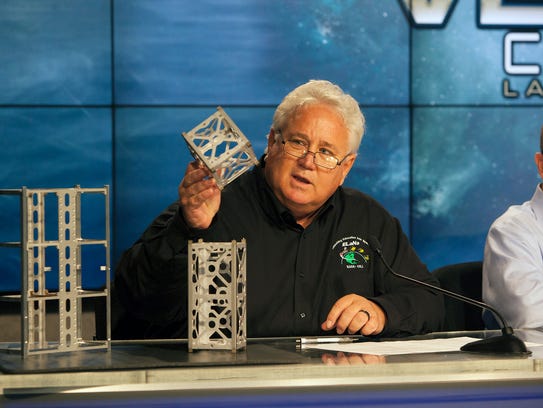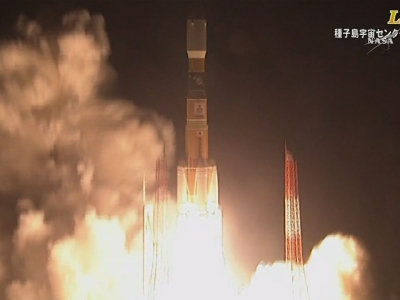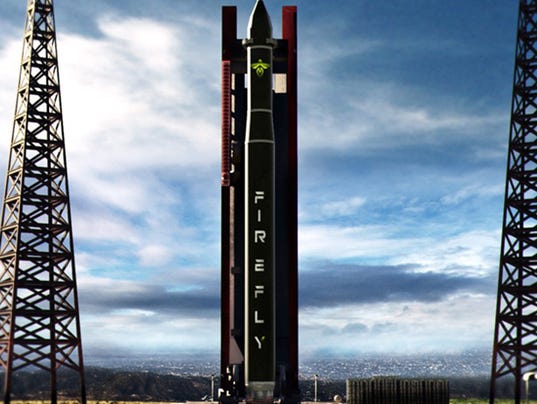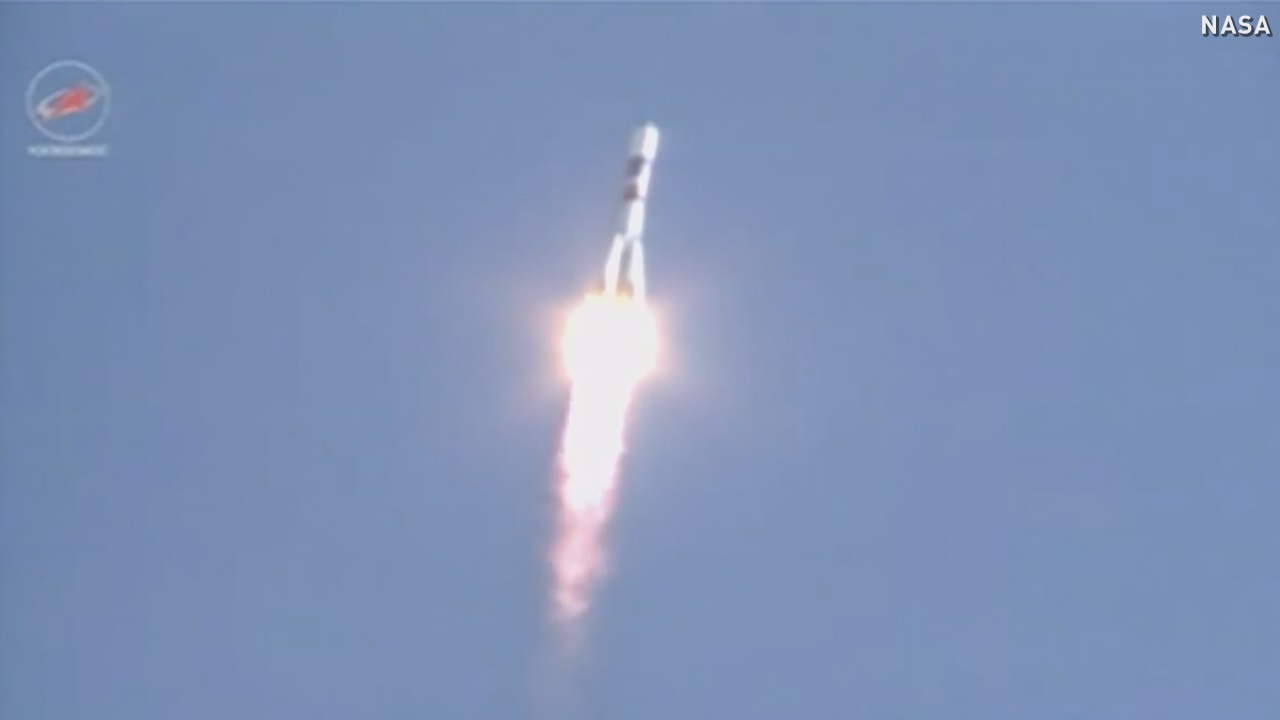Strict Standards: Only variables should be assigned by reference in /home/noahjames7/public_html/modules/mod_flexi_customcode/tmpl/default.php on line 24
Strict Standards: Non-static method modFlexiCustomCode::parsePHPviaFile() should not be called statically in /home/noahjames7/public_html/modules/mod_flexi_customcode/tmpl/default.php on line 54
Strict Standards: Only variables should be assigned by reference in /home/noahjames7/public_html/components/com_grid/GridBuilder.php on line 29
CAPE CANAVERAL — A new rocket designed to launch small satellites plans to perform test flights next year from a new pad at Kennedy Space Center.
Texas-based startup Firefly Space Systems' 77-foot-tall Alpha rocket could be the first to use KSC's pad 39C for the suborbital test flights.
"At that time we’ll be proud to call ourselves Floridians and signal to the world that the most exciting and innovative technologies in space access are still happening right here on the Space Coast," said Maureen Gannon, Firefly's vice president for business development.
Firefly is one of three companies that KSC’s Launch Services Program has selected to fly demonstration missions carrying to orbit bunches of small satellites known as CubeSats, some measuring as little as 4 inches on a side and weighing just a few pounds.
In addition to the $5.5 million flight on Firefly’s Alpha rocket, the program has bought rides on Rocket Lab USA’s Electron rocket for $7 million and Virgin Galactic’s LauncherOne rocket for $4.7 million.
NASA and representatives from the companies discussed the contracts Wednesday during a press conference at KSC.
All three rockets are still in development and have not yet launched.
But the Launch Services Program hopes the contracts, awarded through the Venture Class Launch Services competition, help the new vehicles prove by April 2018 that they are ready to serve a growing demand for launches of small satellites.
Those small payloads now must hitch rides on large rockets that typically cost $100 million or more, such as last week’s launch of an Atlas V rocket of a national security satellite from California.
The secondary or “piggyback” payloads are essentially relegated to “coach class” on such flights. They don’t control when the rocket will launch or where it will go, and they may need to sacrifice science goals to avoid potential interference with the main mission.
“This is no longer the case,” said Garrett Skrobot of the Launch Services Program. “The CubeSats will now be the primary payloads on these vehicles. We can basically say now we are riding first-class.”
The three companies will decide where to launch NASA’s missions.

During a Wednesday news conference at Kennedy Space Center, Garrett Skrobot, lead for the Educational Launch of Nanosatellites for NASA’s Launch Services Program, shows the size of the CubeSats that will be launched under NASA's contract award for the Venture Class Launch Services. (Photo: NASA/Kim Shiflett)
Firefly will start with suborbital test flights from pad 39C, a concrete slab NASA built in the shadow of pad 39B, where the space agency plans to launch crews on its 322-foot Space Launch System exploration rocket. The company recently signed an agreement with Space Florida related to the launches, but no further details were immediately available.
Firefly’s launch for NASA in March 2018 could shift location depending on the orbit the small satellites need to get to.
Rocket Lab is headquartered in New Zealand, but is considering the Space Coast as a site for both manufacturing and launches, possibly also at 39C.
Virgin Galactic’s LauncherOne will be “air launched” by a commercial jet that could take off from many runways, including KSC’s former Shuttle Landing Facility, before dropping the rocket from thousands of feet up in the sky.
Each of the companies has commercial customers lined up, and could launch satellites weighing hundreds of pounds, not just the smallest CubeSats. Virgin Galactic’s LauncherOne, for example, has a contract to launch nearly 40 satellites for OneWeb, a company that plans to launch a constellation of more than 600 small satellites to low Earth orbit to increase high-speed Internet service to underserved parts of the world.
“In the private sector, we are now seeing that this is not just the playground of people who are interested in the technology, but this is real business,” said Steve Isakowitz, president of Virgin Galactic. “We find ourselves with private institutional and venture class investors that are putting serious money to see that this happens.”
But the company representatives said NASA’s commitment to invest just over $17 million to buy launches represented an important vote of confidence in their fledgling small launchers.
“Space is no longer just for high-value science or the intelligence community.”
Mark Wiese, Kennedy Space Center“Having that NASA stamp of approval and that science that can be done I think is hugely important,” said Peter Beck, Rocket Lab’s CEO.
NASA is eager to see lower-cost launches of CubeSats because they represent a more affordable way to test new technologies that could be applied to more expensive science missions around Earth or other planets. A pair of CubeSats next year will help monitor NASA’s InSight lander as it descends through Mars’ atmosphere.
The agency also supports CubeSats as an increasingly popular way for university and even younger students to gain experience designing and operating spacecraft. Students at Merritt Island High, for example are developing a CubeSat mission called “StangSat” that could launch next year.
In all, more than 130 of the little spacecraft were launched last year around the world. NASA is seeking rides for about 50 over the next several years, and the new launchers each could launch 15 to 30 at a time.
“We’re at a point in technology where innovations, manufacturing and the growing need for data in our hands real-time has kind of opened the door for where we’re at with CubeSats,” said Mark Wiese, flight projects office chief in the Launch Services Program at KSC. “So space is no longer just for high-value science or the intelligence community. It is a place for a payload that you can create that can get up to space.”
Read or Share this story: http://usat.ly/1LuEcFq










Strict Standards: Only variables should be assigned by reference in /home/noahjames7/public_html/modules/mod_flexi_customcode/tmpl/default.php on line 24
Strict Standards: Non-static method modFlexiCustomCode::parsePHPviaFile() should not be called statically in /home/noahjames7/public_html/modules/mod_flexi_customcode/tmpl/default.php on line 54
Find out more by searching for it!











